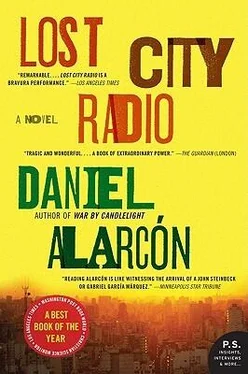Daniel Alarcon - Lost City Radio
Здесь есть возможность читать онлайн «Daniel Alarcon - Lost City Radio» весь текст электронной книги совершенно бесплатно (целиком полную версию без сокращений). В некоторых случаях можно слушать аудио, скачать через торрент в формате fb2 и присутствует краткое содержание. Год выпуска: 2008, Издательство: Harper Perennial, Жанр: Современная проза, на английском языке. Описание произведения, (предисловие) а так же отзывы посетителей доступны на портале библиотеки ЛибКат.
- Название:Lost City Radio
- Автор:
- Издательство:Harper Perennial
- Жанр:
- Год:2008
- ISBN:нет данных
- Рейтинг книги:4 / 5. Голосов: 1
-
Избранное:Добавить в избранное
- Отзывы:
-
Ваша оценка:
- 80
- 1
- 2
- 3
- 4
- 5
Lost City Radio: краткое содержание, описание и аннотация
Предлагаем к чтению аннотацию, описание, краткое содержание или предисловие (зависит от того, что написал сам автор книги «Lost City Radio»). Если вы не нашли необходимую информацию о книге — напишите в комментариях, мы постараемся отыскать её.
, she reads the names of those who have disappeared — those whom the furiously expanding city has swallowed. Through her efforts lovers are reunited and the lost are found. But in the aftermath of the decadelong bloody civil conflict, her own life is about to forever change — thanks to the arrival of a young boy from the jungle who provides a cryptic clue to the fate of Norma's vanished husband.
Lost City Radio — читать онлайн бесплатно полную книгу (весь текст) целиком
Ниже представлен текст книги, разбитый по страницам. Система сохранения места последней прочитанной страницы, позволяет с удобством читать онлайн бесплатно книгу «Lost City Radio», без необходимости каждый раз заново искать на чём Вы остановились. Поставьте закладку, и сможете в любой момент перейти на страницу, на которой закончили чтение.
Интервал:
Закладка:
When he became an informer, Zahir thought of this book for the first time in many years, and was struck, as if by a distant love. His reports, he decided, would be like that novel, but to his dismay, they never came out quite right. The village was full of a darkness, a furtive movement that Zahir found impossible to explain. And the strangers: it was not enough to guess where they came from, where they were going. He wanted to capture the faces of these men, but no matter what words he used, they never seemed quite suspicious enough.
Rey, by virtue of his repeated visits, was the first man Zahir was able to describe reasonably well. He thought little of it, did not at the time consider it to be a betrayal of any sort. It was practice: this stringing together of words, these syllables lining up, and with them, an image taking shape. He wrote and rewrote it, labored until it was perfect, and though he was proud of his writing, Zahir didn’t think it was worth showing anyone, at least not yet. Who was this man anyway? Like everyone else in the village, Zahir saw the coquettish way that Adela spoke with the stranger, and neither approved, nor disapproved. It simply was. The man was nice enough, always polite, though not talkative by any stretch. He came three times a year, sometimes more. He spent his time with Adela, and then left for the forest. They said he was a scientist. Of course, no one in 1797 knew him as Rey.
The next month, when Zahir traveled to the provincial capital to turn in his report, he brought with him, in a separate pocket, his description of Rey — three carefully edited pages in which Zahir noted the color of his skin, the shape of his smile, the timbre of his voice, and in which he had invented a story for the stranger to inhabit: the man was IL, a leader, a guerrilla. He had invented tire-burning, he murdered police officers for sport. Zahir transcribed a confession that had never taken place, and these sections of dialogue were, he was certain, the best writing he had ever done. Of course, he wouldn’t show it to the government man, but Zahir liked knowing that he could. These meetings always made him nervous.
Zahir arrived in midafternoon, after traveling all day. It had rained throughout the night. The office was off a muddy side street, not far from the center of town, but then nothing was far from the center of town.
“Anything?” the government man asked after they had completed the requisite pleasantries and complaints about the heat. He had never given his name, but the man was nice enough. He was from the city. He leaned back in his chair. His dress shirt was undone and soaked through with sweat.
“It’s all there, boss,” Zahir said.
The man looked through it — there were only two pages — and frowned.
“Is it all right?”
“I’ve been meaning to ask you, and please don’t take offense. How much schooling do you have?”
“Sir?”
“School. How much did you do?”
Zahir reddened. No one had ever asked him such a thing. With the priest dead and the mayor gone, he might have been the most educated man in the village. “Four years, sir,” he said. Then, after a pause, he added, “If you count what the priest taught me, five.”
The government man nodded. He was a light-skinned man with a bad complexion, but when he smiled, there was something very gentle about him. He smiled now, and motioned for Zahir to sit. “I like you, you know that. You work hard. I’m embarrassing you. Don’t be that way. Listen…Well now…Out with it: I have a gift.”
He opened his desk and retrieved a small book. “I had this sent for you, from the city.”
It was red and small enough to fit in Zahir’s pocket. He flipped through it quickly and saw that the print was very small, smaller even than the Bible the priest had shown him once. Zahir had never seen a book like this one before. “What is it?”
“It’s nothing. It’s a dictionary. You’re very sharp for a villager,” the government man said, “and I thought you might enjoy it. It has words, along with what they mean.” He handed Zahir an envelope, then placed his palms flat on the desk and stood up. “I recommend you go to the market now. Prices only go one way around here: up.”
“Thank you, sir,” Zahir said. He stood and bowed. His heart was pounding in his chest. Had he been made fun of? There was prickly heat on his skin, and he was sweating. With a flourish, Zahir put the dictionary in his breast pocket and smiled. “I have something for you as well.”
“Do you?”
The stranger, Zahir thought. Why not? He was suddenly quite hopeful. He pulled the papers from his pocket, unfolded them, and passed them to the government man. “It’s about one of the strangers. One of the men who comes to the village.”
“Does he have a name?”
Zahir told him Rey’s other name. “And he’s a scientist.”
The government man examined the text. He read it slowly, the edges of his mouth creeping toward a smile, then looked up. “Now this we can use,” he said, beaming. “My dear man, you’re a poet. I knew you were.”
Later, Zahir would look up the word. He knew what it meant, of course, but he wanted to know exactly what it meant, and he would memorize the wording of the definition, and repeat it to himself, just for the sheer pleasure of the sound. A poet . That night, he would tell his wife, and she would not understand. She would pretend to sleep, but he would not believe her, and though the children would be asleep on the other side of a thin curtain, he would tickle her until she giggled, and then he would make love to her.
“Can I keep this?” the government man asked.
There was no going back. “Of course, sir,” Zahir said.
He took his money and left into the relative bustle of the provincial capital. There was a tiny bar at the corner, and he treated himself to a drink. Then another. Zahir drank by himself and looked up words in his new book: village, city, money, war, love . He had another drink and then another, and looked through his new book until it was too dark to see. When he left, it was nearly dusk, the clouds beginning to gather for the evening rain. A breeze blew, and the heat had subsided. He felt light-headed.
He found it in the market, on his way to wait for the truck back to 1797. The government man was right: prices only went up. Rice and dried beans and potatoes and yucca brought from the mountains, each month incrementally higher. In the village, there was always silver fish. Salted, boiled, fried. And plantains; and they made do, didn’t they? Zahir saw it then: a black and shiny machine worthy of — what was it the man had said? — oh yes, a poet . It was a radio, and it played gaudily, loudly from a stall at the edge of the provincial market. It shook him. He went closer. It had been years since he’d heard such an exciting sound.
“All stations,” the salesman said, turning the knob lazily — static, music, static, voices, music, static.
Zahir couldn’t help but grin.
“First payment today, you take it home in six months.”
He gave away his money without hesitation. And it kept him up at night: for half a year, he worried that he’d been swindled, but each month, when he went to collect his money, the salesman was still there, and the radio still played, and it lost none of its power to impress him. Where’s the money? his wife asked, but he never told her. I’m investing, he said. He wrote more and more with the help of his new dictionary and eventually got up the courage to ask the government man for a little raise. In six more months, he would own the radio, he would carry it home with him wrapped in a blanket wrapped in a plastic bag to protect the machine from rain. He had just enough money. He made calculations in his head. Six more months until he would shock his wife and his son and his daughter and the entire village. He would take his seat among the bags of rice aboard the back of an open truck, he would carry the apparatus against his chest as one might carry a child. The idea of this moment filled him with hope. I am a man in the employ of the government! I am the mayor of this town! And he was — who else would want such a task? Later, when the IL returned and took his hands, and Zahir could no longer farm or write, the canteen owner extended him a generous line of credit, on which he and his family survived for months. Then the rainy season came, and with it, a sense of despair Zahir had never felt before, and there was no war by then and no money available for faraway spies. The government man would not help him; in fact, he must have returned to the city, because the office was boarded up and inhabited by squatters who spoke an impenetrable dialect. Zahir asked around the provincial capital, but no one seemed to remember the government man at all. Inevitably, Zahir fell behind on his payments, and he canceled his debt to the storekeeper with this same radio, and on that day, he wept. He missed the war, he said to himself, those were the good old days. He gave the dictionary to his boy and told him to study hard, but Nico was never one for school. One day, when his teacher, Elijah Manau, reprimanded him for not completing his homework, Nico dropped the little red book into the river just to watch it sink.
Читать дальшеИнтервал:
Закладка:
Похожие книги на «Lost City Radio»
Представляем Вашему вниманию похожие книги на «Lost City Radio» списком для выбора. Мы отобрали схожую по названию и смыслу литературу в надежде предоставить читателям больше вариантов отыскать новые, интересные, ещё непрочитанные произведения.
Обсуждение, отзывы о книге «Lost City Radio» и просто собственные мнения читателей. Оставьте ваши комментарии, напишите, что Вы думаете о произведении, его смысле или главных героях. Укажите что конкретно понравилось, а что нет, и почему Вы так считаете.












